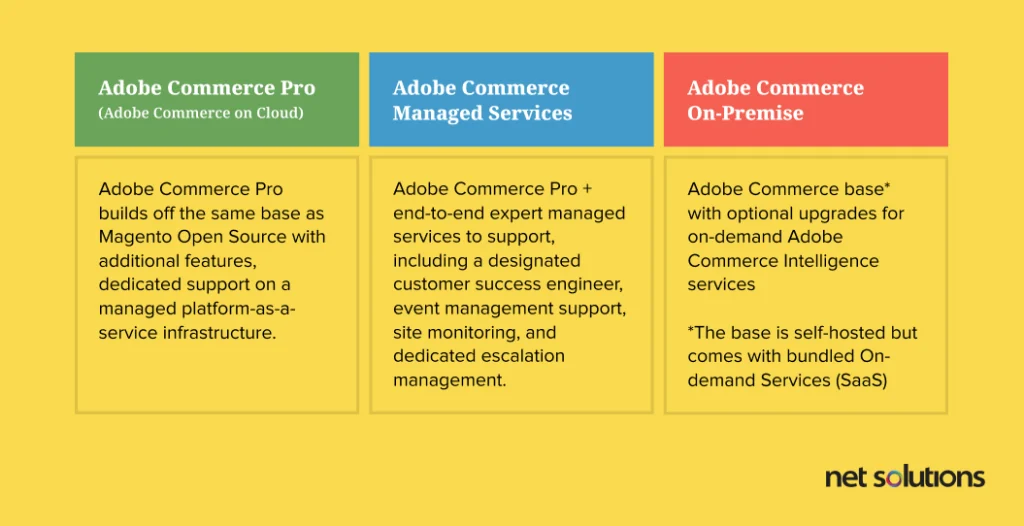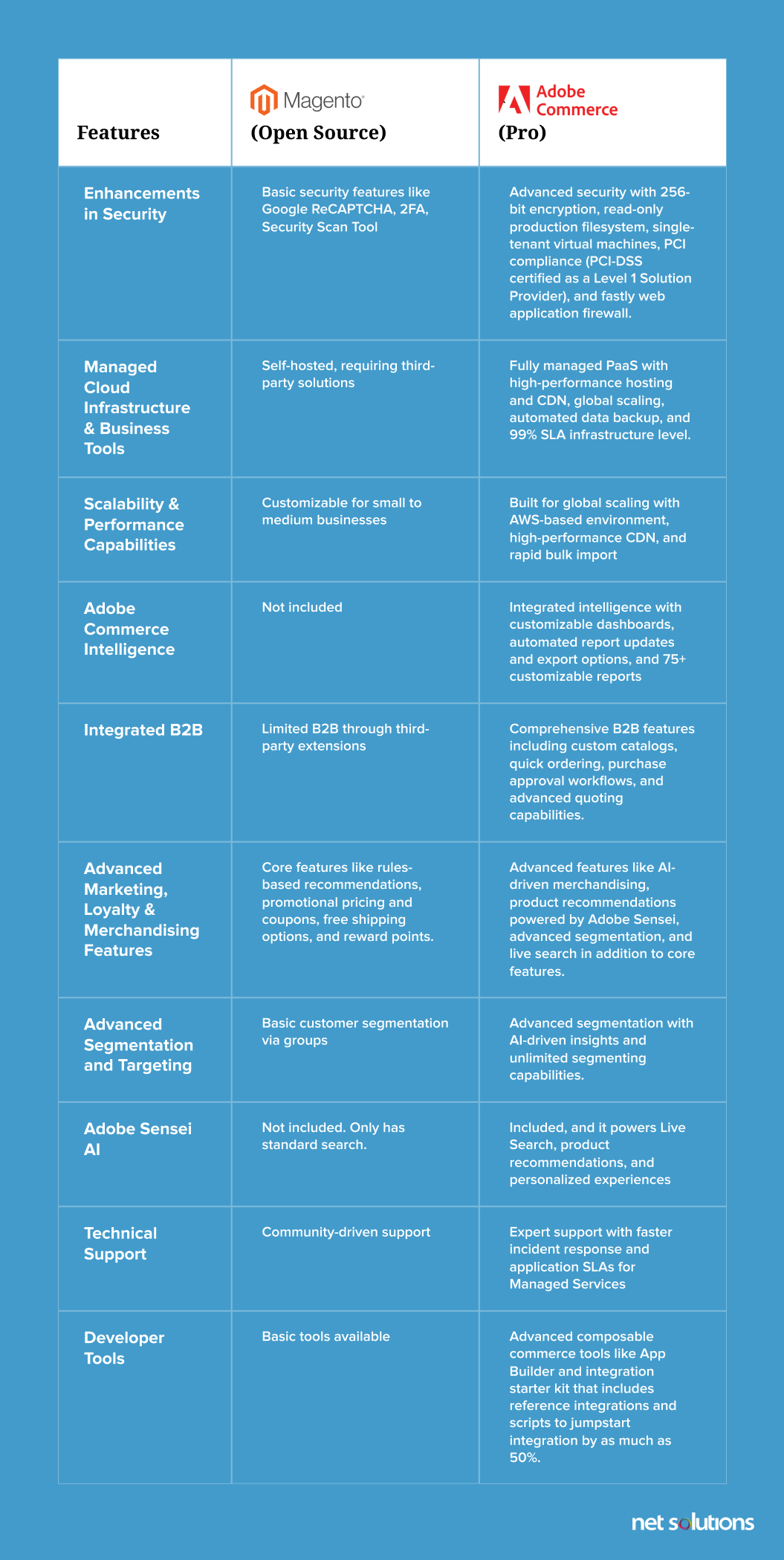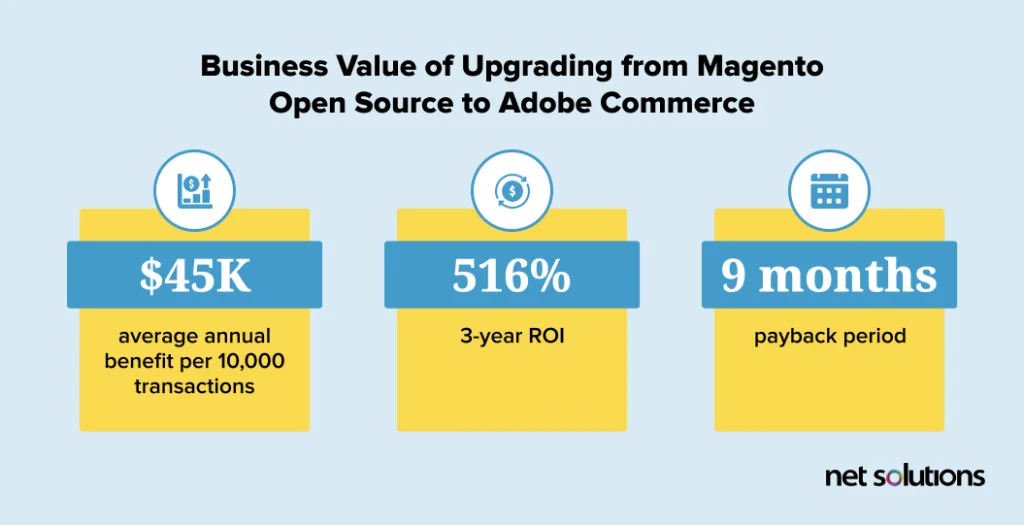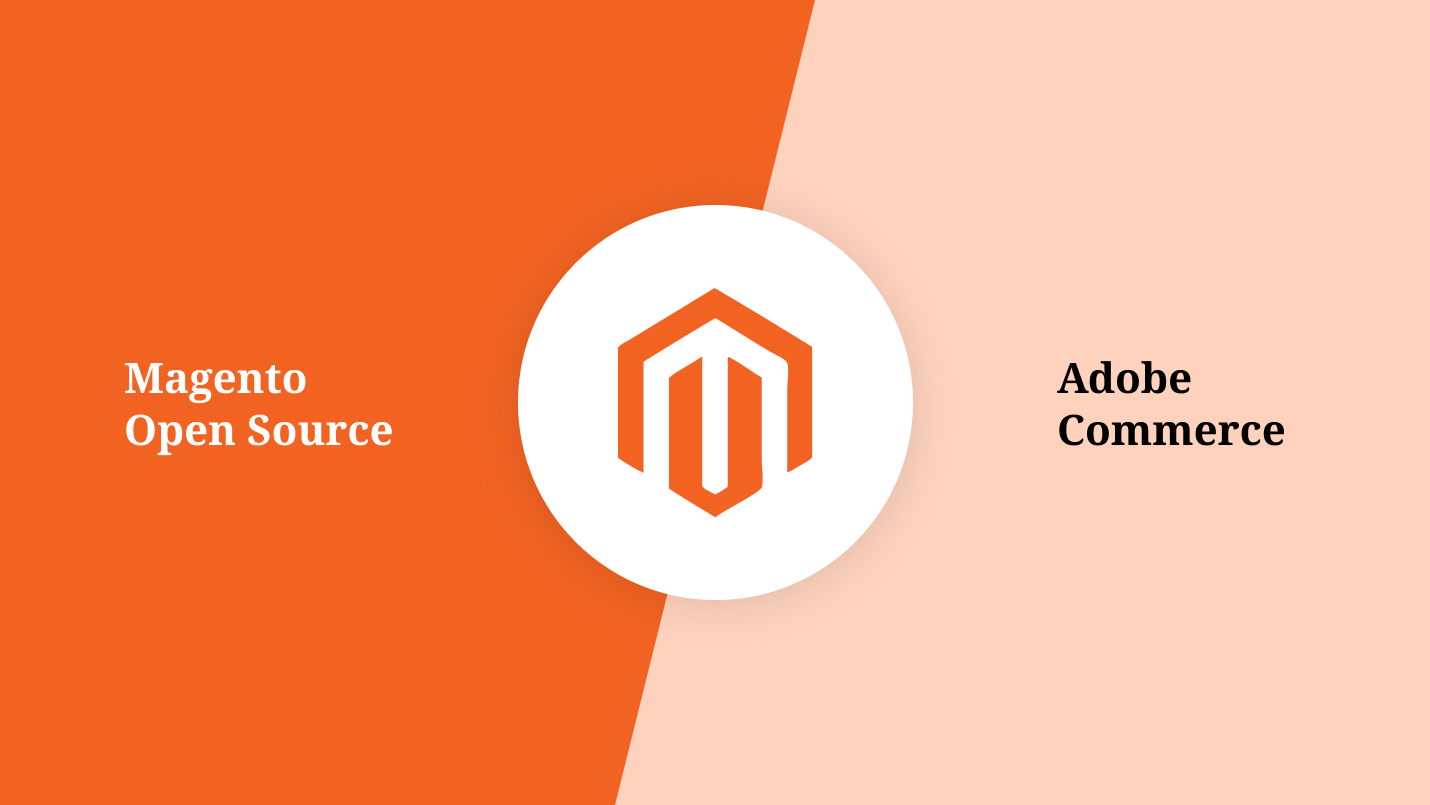The main difference between Magento Open Source and Adobe Commerce is that Magento Open Source is a free, self-hosted eCommerce platform while Adobe Commerce is a licensed, enterprise eCommerce platform, available for both on cloud and on-premise.
In this guide, you will find a full comparison between these two eCommerce platforms, that share the same Magento base, to help you determine which edition is right for you. This guide will detail:
- Core features of Magento Open Source
- Added features of Adobe Commerce (40+ additional features and capabilities)
- Price differences between Magento Open Source and Adobe Commerce
- How to choose which platform is right for your business
Disclaimer: The information below is accurate as of August 22, 2024.
Overview of Magento Open Source
Magento Open Source (previously Magento Community Edition or Magento CE) is a free version, downloadable eCommerce platform Adobe makes available for you to use under rights that let you use or change the source code. Magento Open Source leverages “Magento 2,” the latest base eCommerce platform that has all the basic tools to create and manage an online store.
To get started with Magento Open Source, developers implement the core files on GitHub onto an appropriate hosting environment (Linux OS, an Apache web server with PHP, MySQL and a search engine), add extensions or themes from the Adobe Marketplace, and customize as needed. Magento Open Source is created for entrepreneurs and developers, but it can be used by stores of any size or as a stepping point before transitioning to Adobe Commerce.
The Magento 1 codebase was retired in 2020. All downloads of the Magento eCommerce platform today are Magento 2. If you are still on Magento 1, follow our Magento 1 to Magento 2 migration guide.
Overview of Adobe Commerce
Adobe Commerce (previously ‘Magento’) is a flexible, scalable enterprise eCommerce platform, available as a licensed product for the cloud (Adobe Commerce Pro and Adobe Commerce Managed services) or for on-premise deployment (Adobe Commerce on Premise). Adobe Commerce has many unique features, capabilities and composable services that help business owners get ahead of the competition and build personalized omnichannel B2B and B2C experiences at scale, for an infinite number of brands under your control.
Adobe Commerce can be deployed as a coupled (traditional) eCommerce solution with a responsible website, decoupled with a frontend in PWA studio, or using headless architecture that can extend to Adobe or custom frontends.

Adobe Commerce is recognized as a seven-time Leader in the digital commerce space due to its continued investment in innovation and its high level of service and performance at scale. Learn more in our Guide to Adobe Commerce.
Magento Open Source vs Adobe Commerce: Feature Comparison
In this section, we will outline the core eCommerce functionality that are shared by both Magento Open Source and the paid version, Adobe Commerce (both of which use the Magento core), as well as outlining the advanced features that Adobe Commerce offers over Magento Open Source.
Magento Open Source offers everything a developer or small business owner needs to get started with digital commerce. To take that online store to the next level, and scale across the globe with unmatched performance and capabilities, Adobe encourages businesses to upgrade to Adobe Commerce.
Since the most significant benefits are available on Cloud, and this is Adobe’s primary focus for Adobe Commerce, this comparison chart will look at Adobe Commerce Pro (the base on Cloud offering) and its capabilities for larger businesses.

Let’s look at some of these additional features of Adobe Commerce up close.
What Are The Differences Between Magento Open Source and Adobe Commerce?

In the following section, we’ll look at the added benefits and capabilities of Adobe Commerce products for your eCommerce business. Where relevant, the features of Magento Open Source will first be outlined first so it’s clear what the key differences are between the platforms and clearly explain the added features available in the Adobe Commerce products.
1. Enhancements in security
Adobe maintains regular scanning, penetration testing and bug bounty programs for the core platform, issuing regular updates for both Magento Open Source and Adobe Commerce to address vulnerabilities. In self-hosted instances, you can take advantage of built-in platform security features to address eCommerce security such as:
- Google ReCAPTCHA
- Two-factor authentication
- Strong password requirements
- Security Scan Tool
Adobe Commerce on cloud infrastructure includes
- 256-bit key encryption
- Read-only production filesystem
- Single-tenant virtual machines, 99.9% SLA
- PCI compliant (PCI-DSS certified as a Level 1 Solution Provider)
- Fastly Web Application Firewall
Adobe Commerce Manage Services includes additional support to enhance security coverage, share best practices, and assist with monitoring and patching.
2. Managed cloud infrastructure & business tools
Magento Open Source and Adobe Commerce on Premises are self-hosted, adding all extra costs and time for these efforts onto your business. Adobe Commerce on Cloud products are platform-as-a-service (PaaS) with hosted services (Software-as-a-Service or Saas), including:
- Reliable, high performance hosting and CDN (Fastly)
- Scale globally on AWS and Azure
- Expansive monitoring & alerting
- Technical account manager
- Automated data backup
- 99.9% SLA infrastructure level
- Content staging and preview
- Scheduled import and export of data
*Note, this does not apply to Adobe Commerce on-Premise
3. Scalability & performance capabilities
Adobe Commerce on Cloud products are built for global scaling and high performance:
- AWS-based environment
- High-performance CDN
- Add-on SaaS accelerators
- A recent 30% improvement in GraphQL API response time with a new GraphQL Application Server
- Rapid bulk import (up to 100K records per minute)
- Surge capacity monitoring & response
- Site-wide analysis tool
- Queuing technology to speed checkouts
The above do not apply to Adobe Commerce on-Premise, but the on-Premise version does have the following additional capabilities:
- Separate checkout, order management and product databases
- Support for multiple secondary databases
- Compatibility with MySQL Cluster
4. Adobe Commerce Intelligence
Adobe Commerce is a unified platform, bringing together digital commerce with predictive intelligence. Adobe Commerce Intelligence helps business owners to track buyer patterns, enhance personalization, and inform decisioning including:
- Consolidated data sources
- Customizable dashboards to track KPIs
- Automated report updates and export options
- 75+ customizable reports
*Note, this is available as an upgrade for Adobe Commerce on-Premise
5. Integrated B2B
Magento Open Source can support B2B functionality with the use of third-party extensions or developer customizations.
Adobe Commerce supports integrated B2B functionality for B2B stores and marketplaces, by extension and activation, from a single interface, with features including:
- Custom catalogs and pricing (as well as payment and shipping options)
- Quick ordering and requisition lists to support reorders
- Purchase approval workflows
- Account management capabilities (self-service portal)
- Role assignments and permissions
- Support for payments on account
- Advanced quoting capabilities
Learn more about all the Adobe Commerce B2B features (available for on Cloud and on-Premise versions) or how to choose the right B2B eCommerce platform.
6. Advanced marketing, loyalty & merchandising features
Marketing capabilities are critical to the success of your online business. Magento Open Source includes the following core features:
- Rules-based recommendations (related products, up-sells, cross-sells)
- Promotional pricing and coupons
- Wish lists
- Multiple images per product
- Tier pricing support
- Free shipping options
- Shopping cart persistence
- Search engine optimization (SEO) friendly
- Reward points
- Physical and virtual gift cards (with credit or gift card for returns)
- Private sale support
- Multiple wishlists and gift registry support (plus gift wrapping, gift cards, gift receipts)
Adobe Commerce Pro includes all of the above features, but adds:
- Product recommendations powered by Adobe Sensei AI
- Live Search by Adobe Sensei
- Advanced segmentation (see below)
- Drag-and-drop visual merchandising
- AI-driven merchandising
- Automated abandoned shopping carts and wishlists
7. Advanced segmentation and targeting
Adobe Commerce features exclusive capabilities to support customer segmentation based on properties such as address, order history and shopping cart contents. You can also use customer groups to apply different catalog price rules and more.
Adobe Commerce can also integrate with Advanced Segmentation, which uses its “Segmentation IQ” feature to discover differences among customers to uncover segments that are actually driving KPIs to allow you to take action that has stronger ROI. Machine learning is able to deliver unlimited segmentation and information to predict churn, likelihood to convert and more, while also delivering visualizations on how users are using (or not using) the site to help refine design, navigation and more.
8. Adobe Sensei AI
The Adobe Sensei AI is now powering advanced, integrated capabilities in Adobe Commerce on Cloud including Live Search (replaces standard search in Magento Open Source) with AI-powered dynamic faceting and re-ranking of search results based on shopper behaviors. Live Search helps customers find results faster and drives greater personalization, while still respecting merchandising rules to bury or boost products according to your needs.
Adobe Sensei also powers Product Recommendations, AI-fueled recommendations based on popularity, trends, similarity, or recommendations specific to a shopper or item.
9. Technical support
Magento Open Source relies on the active Magento community and the Adobe knowledge base, though it can be difficult to separate Magento Open Source information. Adobe Commerce includes expert support in the license, while Adobe Commerce Manage Services contains the highest level of technical and account support, with application SLAs and faster incident response times.
*Note, Adobe Commerce on-Premise includes limited support.
10. Developer tools
Adobe Commerce is moving toward “composable commerce,” which is enabled by several “tech-enabled commerce” tools such as the App Builder (with API coverage, webhooks, granular control and event-driven integrations) and an integration starter kit that includes reference integrations and scripts to jumpstart integration by as much as 50%.
Magento Open Source vs Adobe Commerce: Cost of Licensing
While Adobe Commerce is available at a high licensing cost, IDC data indicates that organizations that upgrade from Magento Open Source to Adobe Commerce average a 516% 3-year ROI, with payback in 9 months, for an annual savings of $45,000 per 10,000 transactions.

| Pricing | FREE Add hosting, integrations, security, etc | Based upon Gross Merchandise Value (GMV) and Average Order Value (AOV). License fee ~$40,000-$450,000 / year | Adobe Commerce Pro + services License fee starting at ~$30,000 / year | Based upon GMV and AOV. License fee starting at ~$24,000 / year |
| Features | Basic core | Advanced (B2B, marketing, business and intelligence) | Advanced (B2B, marketing, business and intelligence) | Advanced (B2B, marketing, business and intelligence) |
| Customization level | High | Very High with new Composable Services | Very High with new Composable Services | Very High with new Composable Services |
| Scalability & performance | Limited by customer choices Depends on hosting & configuration | Very high | Very high | Limited by customer choices |
| Security | Basic | Comprehensive Platform + services | + Expert services | Some included |
| Support | Community only | Advanced | Highest possible level | Limited |
| Marketing capabilities | Basic | Advanced personalization | Advanced personalization | Enhanced with add-on services |
Read more in our Adobe Commerce Pricing Guide.
The Bottom Line
When it comes to choosing the right version of Adobe Commerce, there are many factors to consider, from what is right for your business, your business goals, budget, developer skill set and the competitive landscape.
What is Magento Open Source best for?
Adobe maintains Magento Open Source for developers, startups and small store owners to provide a seamless transition to Adobe Commerce, but it can be used and scaled for any business. However, as your business scales, the lack of advanced capabilities will start to hold back your business and is a clue that it’s time to upgrade.
What is Adobe Commerce best for?
Adobe Commerce is designed to support very large businesses and/or large-scale global brands that need high performance, high security infrastructure and innovative capabilities to compete at scale. Adobe Commerce is best for large, multi-site, multi-brand, multi-business model brands as well as brands that only have a single (but large) web property.
If you are looking to start a Magento Open Source or Adobe Commerce website, or looking to replatform your existing website to take advantage of the capabilities of either platform, we would love to help. Net Solutions is an award-winning Magento Development Services company and has proudly helped brands around the world optimize their Adobe Commerce infrastructure and create designs that delight at every touchpoint.
Discover what tailored eCommerce solutions can do for your business.



